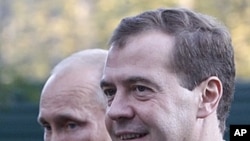Russia's President and Prime Minister have unveiled a plan to switch jobs next year.
Ending months of intense speculation, Prime Minister Vladimir Putin agreed Saturday that he would run for a third term as President next March. Putin previously served as Russian president from 2000 to 2008. Given Kremlin control of the media and political parties, the 58-year-old leader is all but guaranteed to win again this time.
Russia's Constitution has changed and now allows two six-year presidential terms, so a victory could open the doors to a Putin quarter century. If he wins two presidential terms he would be in office until 2024. In recent history, only Joseph Stalin ruled Russia for a similar span.
Speaking at a United Russia party convention in Moscow, Prime Minister Putin nominated President Dmitry Medvedev to head the ruling party's list in parliamentary elections December 4. Putin then said he expected that his protégé would serve as Russia Prime Minister.
Seat warmer?
Analysts long speculated that Medvedev was merely a "seat warmer" while Putin served as Prime Minister due to constitutional restrictions. Today, both men publicly said that, four years ago, at the beginning of Medvedev's presidency, they had made a job swap deal.
Medevedev said it was a well thought out decision that he and Putin discussed at the very start of their political collaboration in running Russia.
Saturday's convention of United Russia echoed accusations that the party is the spiritual successor to the Communist Party of the Soviet Union. In a carefully choreographed event at Russia's largest sports stadium, orderly rows of black suited delegates gave virtually unanimous approval in the vote on the candidate list headed by President Medvedev.
Popular politician
Putin, a judo expert, maintains his popularity with an ever changing variety of televised action events. Most recently, he donned a wet suit and dove for archeological treasures in the Black Sea, and then he donned black leather and rode with a motorcycle club, Wolves of the Night.
Saturday when his microphone failed, the Prime Minister, a former KGB colonel bellowed: "I have not lost my commander's voice."
But Russia's action leader is more popular than his party. Four years ago, in the last parliamentary elections, United Russia polled 64 percent of votes. Today, Putin's approval ratings stand around that level, but the party's approval ratings have dwindled to about 40 percent.
On Friday, Putin lectured party members to "listen to the heartbeat" of voters.
Economy
Critics say that Russia has not bounced back to the level of economic activity it enjoyed three years ago - when the western world plunged into a sharp recession. With another recession possibly looming, Russia's Prime Minister warned party members Friday that they may have to swallow "bitter pills" of economic austerity.
Saturday, his finance minister, Alexei Kudrin warned Russian reporters in Washington that the world, including Russia, faces a "lost decade" of low growth.
This week, Russian stock markets and exchange markets dropped to their lowest level in 2 years. This year, Russia is expected to suffer a net capital outflow of $35 billion.
With oil, gas and minerals accounting for 80 percent of Russia export earnings, analysts worry that if China catches a cold, Russia will catch pneumonia.
Khordokovsky weighs in
This week, behind all the hoopla and digital flags of the ruling party voice, there was a voice from the Russian northern wilderness.
Writing from a prison cell near the Arctic Circle, imprisoned former Russian business tycoon Mikhail Khordokovsky gave an email interview to the Reuters News Agency.
Khordokovsky, who failed a decade ago in a political gamble against Putin, wrote: "The real question is: Will the elections appear fair enough so that the legitimacy of the president is sufficient when the crisis comes? The depth and essence of the crisis I cannot predict, but it is inevitable after 2015."
A crash in world commodity prices could pose the biggest threat to political plans for a Putin quarter century.
Putin Announces Run For President in 2012
- By James Brooke




